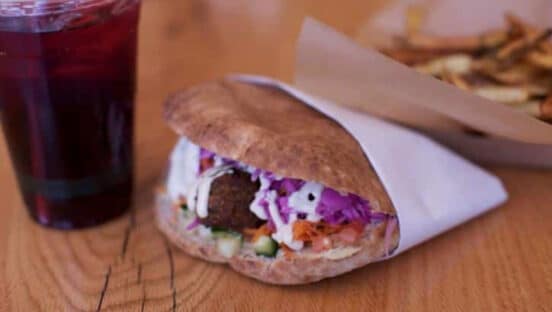Clover Food Lab, a chain aiming to popularize vegetarian dishes, declared bankruptcy November 3 after failing to grapple with the COVID pandemic’s macroeconomic headwinds.
The fast casual operates 12 stores, two kiosks within Whole Foods, a catering business, and a meal box delivery service around the Boston metro area. Founder Ayr Muir stepped down as CEO before the bankruptcy filing but remains a shareholder and member of the board of directors. He was replaced by Julia Piper, who previously served as Clover’s COO for 18 months.
Prior to 2020, the fast casual experienced “rapid growth” and “scale-driven improvements to economics,” Piper said in court documents. In 2019, AUV approached $1.7 million, and the chain swung an 18 percent 4-wall EBITDA. However, when the virus reached the U.S., Piper noted that it had an “immediate and lasting impact on Clover’s business.”
Clover obtained support from government-funded programs, like the employee retention tax credit, and received backing from long-term investors in the form of convertible debt financing. Meanwhile, the fast casual pivoted to the new normal by selling daily meal boxes to people stuck inside their homes. The new business proved profitable and continues to contribute to 20 percent of Clover’s annual revenue.
The brand’s sales and traffic improved in 2022 and 2023, and it projected a return to pre-pandemic levels by 2024. The trajectory was going so well that at the start of 2023, the board of directors and investors expected to raise growth equity to expand around New England and New York City. Based on this objective, Clover signed a lease and began constructing a 2.5x larger commissary in Boston.
The growth plan and equity raise ran into a major setback with the failure of Silicon Valley Bank and sluggish financial markets. As a result, funding was unsuccessful, despite efforts from the board and Muir. Still though, expenses remained, and Clover was on the hook for its long-term lease at the commissary.
In May, the fast casual received a term sheet for new capital that would give it enough money to support 18 months of non-expansion operations. Piper explained in court documents that the plan was to run the current locations and company verticals, grow sales, and reduce costs until revenue was high enough to cover the cost of the commissary and struggling brick-and-mortar units. The first round of capital was $1.8 million. While using these funds, Clover attempted to conserve cash by cutting salaries by 43 percent.
A second round was expected in August but never came. Additionally, traffic and sales softened and rent abatements and government assistance ended. In response, Clover tried to work with landlords to set the chain up for profitability, but “these negotiations did not progress rapidly enough to create long-term viability,” Piper said. The failed talks led to the bankruptcy filing.
“We are all focused on putting Clover on solid financial footing so we can continue to make the food you love for many years to come,” Piper said in a letter posted on the chain’s website. “COVID changed everything for restaurants like us. The way we eat, drink, work, and get together has shifted substantially and, while Clover has seen a steady recovery in sales (and the creation of a whole new part of Clover with our meal box program) our sales are still below pre-pandemic levels.”
Clover is working with professionals to examine its current and future rental obligations. It was evicted from one location in late August and will likely close another. On the eve of bankruptcy, it negotiated a deal to terminate its lease at the commissary.
The concept was founded in 2008 with a mission to make vegetable-based meals a preference for traditional meat lovers. The brand transitioned from a food truck to its first physical store in 2011. About 85–90 percent of Clover’s customers are not vegetarian, according to monthly store surveys.







